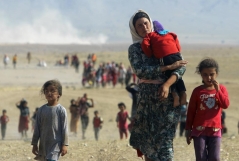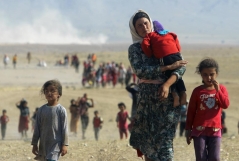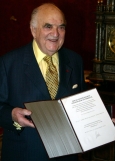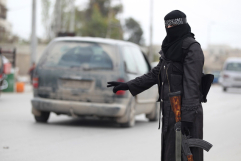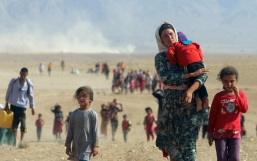The former chief prosecutor for the International Criminal Court (ICC) is pushing for a case to be opened into the "ongoing genocide" against Iraq's Yazidi community at the hands of Islamic State militants.
Luis Moreno Ocampo said he was approached in the United States recently by Yazidi activists who are seeking justice for the systematic slaughter, rape and enslavement of thousands of members of the religious minority in northern Iraq.
"It's a very clear case. It's an ongoing genocide because there are still people in captivity," Ocampo told Reuters in an interview in Erbil, capital of Iraq's autonomous Kurdistan region, late on Wednesday.
"It's up to us to provide information that allows the ICC to understand, yes, we have jurisdiction in this case in this way," said Ocampo, who launched many of the ICC's highest-profile cases, including againstSaif al-Islam, son of former Libyan leader Muammar Gaddafi, and is now a professor at Harvard University. "It's difficult to predict who will be prosecuted because this is the beginning."
It could take years for such a case to be brought to trial, however, given the legal, political and practical hurdles.
The ICC lacks jurisdiction over Iraq because its government is not a signatory of the treaty that established the tribunal, but it would have the right to investigate crimes committed by nationals of one of its 123 member countries.
The court, based in The Hague, has never brought a case on such grounds before and it would mean only nationals of those countries could be tried.
In the past, the ICC has been loath to investigate on the basis of "personal jurisdiction" – the principle that it has jurisdiction over offences committed by nationals of its member states – believing that it is more appropriate for member states to do so.
LIMITED JURISDICTION OVER SINJAR REGION?
As an alternative way into an investigation, Iraq could opt to grant the ICC limited jurisdiction over the Sinjar area from August 2014. That is when Islamic State jihadists attacked the Yazidis, whom they consider devil-worshippers. The Yazidi faith has elements of Christianity, Zoroastrianism and Islam.
Ocampo said he hoped a preliminary examination could be opened before November.
The next step would be for the current prosecutor at the ICC to open a formal investigation, and once enough evidence is gathered, to request warrants for the arrest of the perpetrators so they can be brought to trial, if captured.
Regional Kurdish forces have driven Islamic State out of parts of Sinjar, but most of Iraq's Yazidi population, numbering around half a million, remains displaced in camps inside the autonomous entity inIraq's north known as Kurdistan.
Of around 5,000 Yazidi men and women captured by the militants in the summer of 2014, some 2,000 have managed to escape or been smuggled out of Islamic State's self-proclaimed caliphate, activists say. The rest remain in captivity.
Hundreds were killed during the initial onslaught last year.
Kurdish authorities presented a body of evidence to the ICC last year but it was not examined because of the jurisdiction issue. Ocampo said he would help the Kurds resubmit the material and navigate the legal landscape, but thought it would be "wrong" to litigate before the court himself.
A trial would help the Yazidis heal from their ordeal, Ocampo said. "The Yazidis really need the world to recognize that they suffered a genocide."










